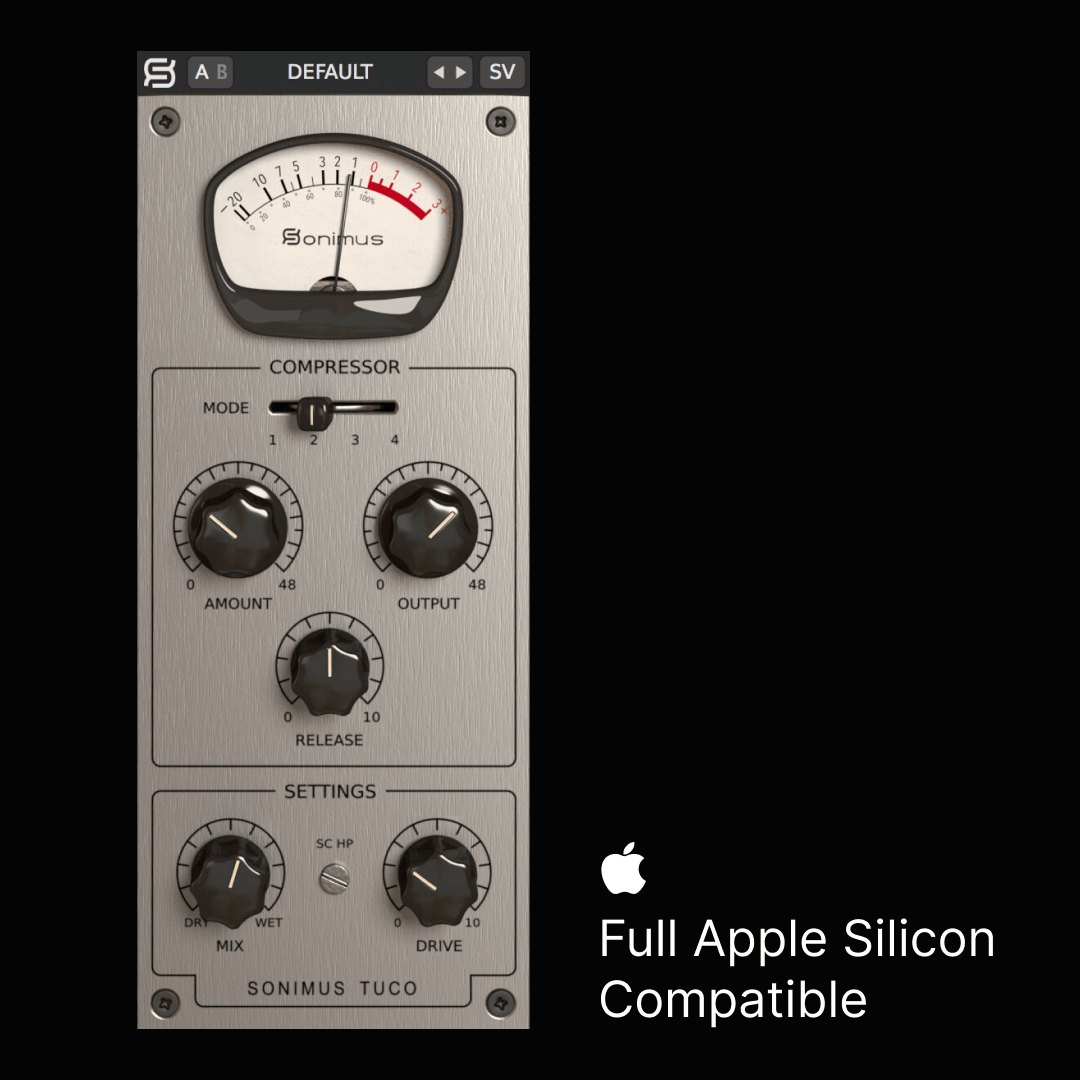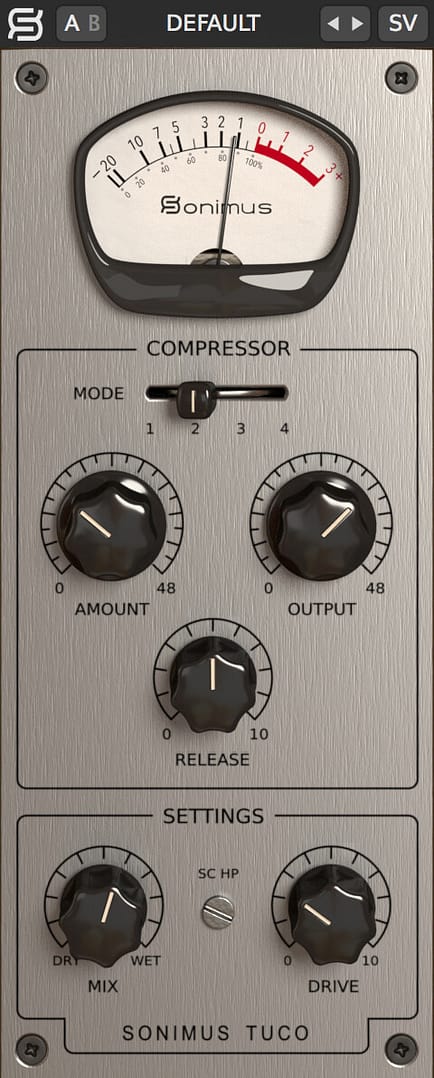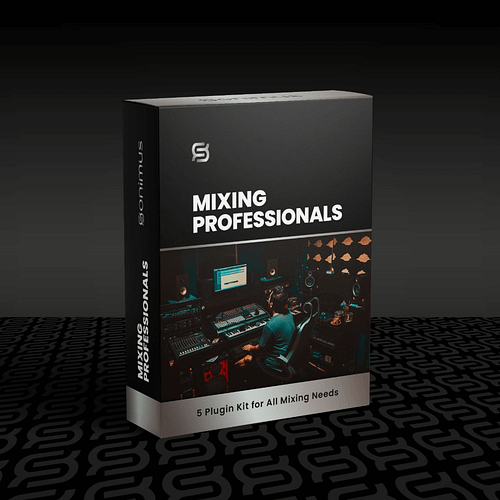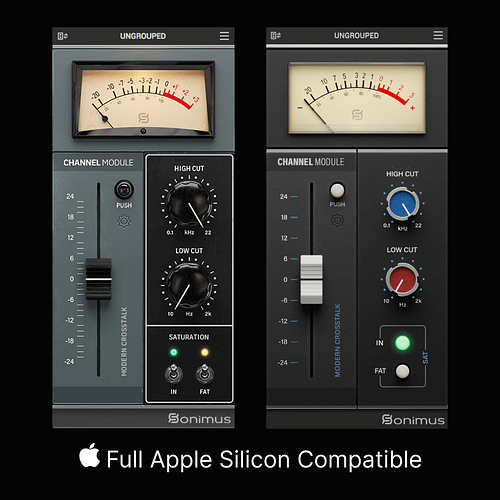Getting the character of analog compression has never been easier. Based on vari-mu tube technology, Tuco brings the clean, warm, and crisp sound with an easy-to-use interface and modern-day mixing features. Get instant glue and tightness to your tracks.
TuCo Compressor
$79.00
Description
Tuco compressor is based on vari-mu tube technology with feedback topology. It can be clean, warm, and crisp at the same time. Exhibiting subtle and natural compression at low amounts and plenty of punch at higher settings. And is an original Sonimus development, designed using analog modeling techniques.
Tuco is ideal for drums, vocals, or any tracking instrument and sounds great applied to a whole mix. Due to its “stereo modes” (Dual Mono, Stereo Vintage, Stereo Modern), it can be used for tracking, as well as for mastering.
KEY FEATURES:
- All tube vari-mu design.
- Four compressor modes:
- Slow Attack Compressor.
- Fast Attack Compressor.
- Slow Attack Limiter.
- Fast Attack Limiter.
- Release knob with slow to fast settings.
- Auto Makeup Gain control.
- Three stereo modes: Dual Mono, Vintage Stereo, Modern Stereo.
- Mix control for parallel compression. (two modes).
- Output tube saturation controlled by a drive knob.
- A/B switch for a/b comparison.
- Presets system to create and edit both user and factory presets.
- Support for HQ screen resolution (Retina).
- Optimized for real-time usage.
Tuco Compressor In-depth
Compressor Mode
- Slow Attack Compressor
- Fast Attack Compressor
- Slow Attack Limiter
- Fast Attack Limiter
Stereo Mode
- Mono: Processes a stereo input through a mono unit compressor
- Stereo Vintage: Feeds the sum of both channels (left and right) into a single unit detector circuit, then applies the same “gain reduction” to each channel. This mode sounds open and wide.
- Stereo Modern: Each channel (left & right) is processed independently. Combines the two gain-reduced channels into one, resulting in an equal gain reduction for both sides.
- Dual Mono: Each channel is processed independently by two compressor units.
VU Meter Mode
- Gain reduction Meter
- Input VU Meter
- Output VU Meter
Auto Makeup Gain
Auto Makeup Gain (AMG) compensates for volume drop resulting from compression. To activate AMG, click on the “Amount” label. AMG does not modify audio dynamics. Rather, it calculates a gain compensation approximation.
Mix Modes
The Mix Before Output Control: You can blend dry/wet without worrying about matching dry and wet signal volumes.
The Mix After Output Control: You must level the compressed signal using the “output knob” to achieve your desired dry/wet signal ratio.
Controls
- Amount: Adjusts the amount of compression. Functions like a “threshold” control.
- Output: Adjusts the compressor’s Make Up Gain.
- Release: Adjusts the compressor’s release speed: 0: Fast, 10: Slow.
- Mix: Mixes the “dry” uncompressed signal with the “wet” compressed one.
- SC HP: Applies a High-Pass Filter to the side chain input signal (useful for bass guitars and/or bass drums).
- Drive: Adjusts the amount of tube style saturation (When set to zero, saturation is bypassed).
Testimonials

“I like the approach of the TuCo, especially the drive, I’m already using it thoroughly on a new movie mix!”

“I am absolutely in love with the Sominus TuCo compressor! It sounds incredible on any instrument. Friendly design and big flexibility make it a must-have!”
Engineering credits: blink-182, Bishop Briggs, Fever 333, From Ashes to New, 5 Seconds of Summer, Sleeping With Sirens, etc.

“…I use these plugins ALL THE TIME! TuCo has found its way as a staple on my mix bus, and seems to add some magic dust to my drums… I have nothing negative to say, I love them…”

“Plug-in developers Sonimus are already well known for excellent emulations of analogue EQs and consoles, but although their first compressor is based on a variable-mu tube circuit as used in the Fairchild 660 and 670, it’s not an emulation of those venerable units. Rather, TuCo shares some of their ‘analogue’ sonic characteristics and adds a few useful features.”










Sergey F. (verified owner) –
very good plugin!
Karl Martin (verified owner) –
Goto compressor for anyone looking to give their tracks rich analog warmth and punch. Itt delivers a character that’s both vintage and flexible, allowing it to adapt beautifully to a range of audio sources. Great for drums, vocals, or an entire mix, it also adds a subtle harmonic depth and a smoothness that’s hard to match with other plugins. It’s really superb!
Steve Etzel (verified owner) –
I’ve had the Tuco compressor for a while and it still stands up to any Vari-Mu Comp out there!!!
Brian Fernald (verified owner) –
Really great compressor – it’s been my go-to drum bus comp. I also really like slamming it in parallel or as a drum + bass parallel comp.. Sonimus makes good plugins and this one is definitely worth picking up!
Robert Friese –
I am using the TuCo Vari-Mu Compressor on every Bus for the glue. It sounds warm and musical. TuCo is also extremely CPU-friendly with Zero Latency and well optimized on my Apple Silicon Mac.
Flavio Gaete (verified owner) –
I’m so happy with Sonimus products and the spirit of the company! This last acquisition is just what the doctor ordered for me, zero latency, straight-to-the point controls and it sounds great!
Oliver (verified owner) –
So sweet. Nice punch
Martijn van Dongen (verified owner) –
Awesome compressor. Very flexible!
Tibor T. (verified owner) –
At first glance, it may not seem like the most versatile compressor where you can adjust individual parameters in detail, but it’s definitely one the most used compressors in my projects now. The “basic knobs” help you focus more on the project and the music, and the resulting sound after compression is very pleasing. Drive knob is… WOW! I might have liked a bigger UI.
kader hamza (verified owner) –
J’avais écouté des démonstrations de Tuco sur les différentes reviews YouTube , ainsi que les vidéos , et j’avais déjà ressenti quelque chose d’assez d’objectif, je m’étais dit que tôt ou tard je devais l’acquérir..et puis le temps est passé, les plugins aussi. Arrive enfin le jour de cette pub et promo, je décide de l’acheter . Premier essais, et pourtant des années de mix au compteur, l’objectivité ressentie dans les démonstrations et devenu concret. Un son doux , chaud , rond , lisse , même après une quantité importante de compression , un son naturel . Impossible de s’en passer . Juste hâte d’acquérir désormais les simulations de consoles analogiques !!!
初音もっこり(え?) (verified owner) –
ええやん☆(日本語ですみません)
まずね、負荷がほぼ無いのがいいねいいね!シンセ音源だけど曲中にアコースティックギターのトラックでアルペジオとソロの部分があるんですがその際Tucoをインサートして調整してみたら歯切れが良くなったね。特にソロ部分はある程度主張した音にしたかったのでDriveを少し上げてFast Attackにしてみたら(確かそうだったと思う)ディレイプラグインのノリも良くなりアコギソロも見栄えが良くなりました(バックの音もバシバシ入ってますが)
このDriveパラメーターはUnitedのRoyal compressorの”SATURATION”と近い飽和感がありますね主観だけど?
本来のアナログ機器が持つ歪みみたいな感じを上手く再現していると思います。理想はハードウェアのマイクプリアンプによるGAIN上げだけどプラグインで再現出来るのであればVST音源にもそれらを活用した方がいいよね。
そりゃ他社の似たようなチューブコンプレッサーやDAW純正プラグインでも同様の効果は期待出来るけどTucoはイージーオペレーションで理想に近くなるから時短にもなる。
基本はAMOUNTとOUTPUTの2つを前後させるぐらいでOK牧場。RELEASEもいじるけど。
MODEはSlow Attackを選ぶ事が多いかな?音色によりますね。当たり前田のあっちゃんだけど。
とにかく初心者にも最適(私もプロみたいなシビアな耳は持ってませんが)
似たようなプラグインをいくつも集める必要はないと思いますがTucoは間違いなく私の制作に必要不可欠な存在となるでしょう。
個人的にTucoとRoyal compressorがあれば他のビンテージ系コンプレッサーはしばらくの間は必要ないと思う⁇
(VTC-2のDriveの歪み感もいいんだよなぁ)
Yeah ☆ (sorry for the Japanese)
First of all, it’s nice that there’s almost no load! Although it’s a synth sound source, there is an acoustic guitar track in the song with arpeggios and solo parts, but when I inserted Tuco and adjusted it, it became crisper. In particular, I wanted the solo part to have a somewhat assertive sound, so I raised the Drive a little and set it to Fast Attack (I think it was), and the delay plug-in had a better feel and the acoustic guitar solo also looked better (backing sound). (Although there is a lot of it)
This Drive parameter has a saturation feeling similar to United’s Royal compressor’s “SATURATION”, but it’s subjective, isn’t it?
I think it successfully reproduces the distortion-like feel of original analog equipment. The ideal would be to increase the gain using a hardware mic preamp, but if it can be reproduced with a plug-in, it would be better to use it for VST sound sources as well.
Of course, you can expect similar effects from other companies’ similar tube compressors or DAW genuine plug-ins, but Tuco’s easy operation makes it close to ideal, which saves time.
Basically, it is OK to change the AMOUNT and OUTPUT values back and forth. I’ll also play around with RELEASE.
Do you often choose Slow Attack as MODE? It depends on the tone. It’s Acchan from Nakeda.
Anyway, it’s perfect for beginners (although I don’t have a serious ear like a professional)
I don’t think it’s necessary to collect many similar plug-ins, but Tuco will definitely become an essential part of my production.
Personally, I don’t think I’ll need any other vintage compressors for a while if I have the Tuco and Royal compressor.
(The distortion of VTC-2’s Drive is also nice.)
Anonymous (verified owner) –
GOOD COMP!! CPU Friendly&edge sound
Hans (verified owner) –
I already use several great compressor plugins, which I love, but the TuCo is a special kind of beast. So easy to get great results and it has its own sound, that really hits my taste.
Adam M. (verified owner) –
Super compresor
Dusan Z. (verified owner) –
Great sounding compressor! Easy to adjust and usable on any track, even on master bus.
urstanner23 (verified owner) –
For me, this is by far the best compressor emulation ever. I used alot of Waves and Plugin Alliance stuff and especially the Townhouse compressor for my drumbus. I never really felt, that it was glueing my drums together and making a difference and I was a little dissappointed. I thought that all the positive reviews about Townhouse meant that it was just me, not hearing the quality of this plugin. Until I tested the TuCo. I literally was blown away! This is the first compressor I use that is really glueing things together. The sound is fantastic! Warm and punchy! And the price is relatively cheap comparing to other stuff. And the guys at Sonimus are really nice and supportiv! I am more than happy, that I finally found a company with products to use in my everyday mixing and producing situations and that really sound good and you really hear a difference!! God bless you guys! All the best from Switzerland :-)
Mike Erwin (verified owner) –
Just used TuCo along with A-console for audio post mix for video shoot of a live benefit concert with Randy Owen, Jamey Johnson and Riley Green. Very impressive color and feel. Thanks Sonimus team!
Rory (verified owner) –
Anonymous (verified owner) –
It’s a nice compressor! very versatile
Michael (verified owner) –
A great sounding compressor. Easy to dial in. I definitely recommend it!
Alex Ribeiro (verified owner) –
I love it. In any tracks or channel
Joseph M. (verified owner) –
Love it Love it Love it!
Ryan Huggins (verified owner) –
I am something of a plugin snob. I find them fascinating – and I have just about every tube compressor on the market. Even the esoteric stuff from smaller companies (including lots of Nebula libraries)..in addition to hardware. I love my tools – its almost a side hobby for me.
People are sleeping on this compressor and this company in general. This particular comp has an action that is incredibly musical. The way it reacts to the input signal is gorgeous….it does what a good compressor should do – in the words of JJ Puig, it makes the music “dance”. Really, its a beautiful thing that a lot of in the box compressors cant nail. This one does it exceptionally well.
The box tone is very elegant. Its euphonic and characterful without being overly colored (like a real high end tube piece should be). The saturation is also very realistic and imparts a lovely sheen onto the material. Its very nuanced and just sounds very good.
I dont know how it took me so long to try this compressor, but its magic. Of the thousands of plugins on my harddrive, there are only a few that make my template and enter my rotation – and this one definitely has. I dont know what else I can say…SUPPORT these guys they are doing fabulous work.
Pedo B. (verified owner) –
exelente pluyin
Rojh Baquiran (verified owner) –
Great sound
Valentyn Zhuk (verified owner) –
I am very happy with the plugin.
Tuco is capable of solving many problems. Especially good with vocals and drums. Bass and guitars sound interesting with him.
The best part is, setting up this compressor takes very little time. Thanks to the developers for a great plugin!
Anonymous (verified owner) –
Wonderful. This is a great character compressor for a drum buss and even the master buss. It stands alongside a few other top vari-mu compressors in providing a different flavor. It’s comparable to both Magic Death Eye Stereo (another favorite of mine) and MJUC. It is somewhat more SSL-buss-sounding than MDE and definitely simpler in options than MJUC. It is impossible to “hurt your sound” with this one. I love the simple compress vs limit and fast/slow options switch which again, takes the guess work out of providing unlimited options. As I’ve said for other Sominus plugins, this one is characteristic of analog hardware because it limits/constrains you the way analog hardware does. Sonimus is terrific at providing these boundaries while including just the right amount of extra digital goodness that elevates the plugin above hardware. I think we all tend to forget that one of the things we loved about hardware is the relatively limited range of sounds one can achieve from a given unit. This plugin hits that on the head while still providing us with modern options.
Anonymous (verified owner) –
Kip Casey (verified owner) –
While other compressors do their job by taming the high level parts of a signal, creating a perceptional illusion of the low level parts being louder, this little boy really seems to do compression, expansion and leveling at the same time. At least it feels like that. That’s the “glue” effect, THE real “GLUE”. Took me two hours to realise, that no other “elite” compressors can handle any material in a very careful and musical way, like TuCo does. Even when i roughly matched attack and release on other compressors, they still don’t sound the same, and TuCo takes no time to set right. Dial “Amount”, choose “Mode”, tweak “Release” and “Output”. Done!
Here in Russia we usually buy a bag of buckwheat for a month, then we can think about buying a plugin we can afford. And it has to be a plugin of an exceptional quality, sound and feature wise. So i couldn’t resist this generous offer from Sonimus, $29 dollars for this ultimate thickener, what a deal!
Demo this beast, try it on drums. You won’t regret buying this compressor afterwards
yj kwon (verified owner) –
Great…….
Alexander (verified owner) –
Tested on guitar…instant buy. Sounds way more natural and smooth than comparable software to me.
Timothy Fransky (verified owner) –
Petar Atmadzhov (verified owner) –
Really good compressor, will use it a lot.
Steve MacMillan (verified owner) –
HUGE sounding! Highly recommended.
Илья Денисенко (verified owner) –
This is a great compressor! Soft, round, hard, he can do anything! It has its own special character. A group of drums, a group of guitars, basses, vocals, it works with all possible options and can do things that you don’t even expect!
Sonimus, you are unique guys!
Patrik L. (verified owner) –
Works on everything I used it on, incredibly good.
Eul N. (verified owner) –
Good and simple 👍
Monique (verified owner) –
Beautiful sound, easy to use.
Alexandre Ribeiro (verified owner) –
I’m suspect but not a liar. This is the cherry of the Birthday’s Cake
Stephen L. (verified owner) –
Gernot Pflueger (verified owner) –
I own tons of compressors but Tuco is something special. It can be buttery smooth or punchy as hell. Especially the knee smoothness is audible in a way (f.e. on drum busses) that i only experienced with expensive hw compressors. I am really really impressed. And it`s easy to operate, too.
Igor R. (verified owner) –
Great Apps! Reccomend to all
Roehl Pagala (verified owner) –
Nice on vocals!
Anonymous (verified owner) –
Just love it…my go to compression on vocals.
Raymond K. (verified owner) –
So simple, so useful, so good. Less is more when the effect plugin is the right choice.
David (verified owner) –
Really Nice Compressor Sonimus are my favorite plugin company theses days
Alex A. (verified owner) –
Richard Pflueger (verified owner) –
A wonderful compressor! Easy to use and sounds amazing!
Jürgen Weber (verified owner) –
Very good
JULIEN RIEU DE PEY (verified owner) –
Subtil rond et chaud. Réglages précis, très bon compresseur. Utilisé pour l’instant pour un mastering ITB. Très belle vibe Très belle valeur ajoutée.
Les plugins Sonimus remplacent petit à petit les autres plugins…. beaucoup plus chers
Beau travail. Merci.
SselemaN (verified owner) –
🔥🖤🔥
Faron Collins (verified owner) –
Very good compressor. Can find the right mix on most instruments. Really shines on a master mix bus glues it all together and makes everything fit in the mix
Lucas Jose Serena (verified owner) –
Pretty neat on voices, gtrs and drums. I did get some trouble to make it work good on basses, but that must be on me :P. NICE DRIVE!
Paul S. (verified owner) –
Might rate higher once I figure it out
Anonymous (verified owner) –
Love it but missed the Black Friday
Dave O’Higgins (verified owner) –
Easy to dial in very musical compression on any source. It has some vintage “mojo” without ludicrously overcooking it. The GUI is intuitive to use & the simplicity keeps you listening instead of fiddling. Highly recommended.
John Ellis (verified owner) –
This has been a game changer for me. No more complicated knob turning and the sound is incredible. I now use it on all tracks and my mixes have improved ten fold. Well done Sonimus.
Marcel Kanche (verified owner) –
Excellent ! doux chaleureux simple d’utilisation un canapé douillet pour mes oreilles (test sur piano acoustique). Après moult essais sur d’autres plug’s plus expensifs Enfin le bon outil ! Merci Sonimus
Anonymous (verified owner) –
Very versatile
ARSEAU frederic (verified owner) –
Tout comme les autres produits sonimus que j’ai acheté je suis satisfait de la qualité du tuco. Simple, efficace, qualité de l’effet.
Pas de clé usb pénible à mettre en oeuvre et prix très attractifs surtout quand on voit la qualité des produits qui n’ont pas à rougir face à la concurrence haut de gamme
Je possède plusieurs plug-in de la marque , soneqpro, burnley 73, satson et britson . Je les conseil tous sans aucune réserve
Fan de sonimus je ne le cache pas
thanosbikos (verified owner) –
Impressive character & minimal design. The two main knobs work like an LA2A with compression and output gain. The four stage switch of ratio & attack seems limited but it turns out it’s all I need for a variety of applications. It was a good idea to have a dedicated release knob, to match the groove of the song. The drive does wonders to limit the untamed peaks that escape the main circuit. Smooth soft clipping which preserves valuable headroom for the rest of the mix.
Sounds great on practically everything. Drums (from transparent taming to aggressive envelope shaping), bass, perfect on piano, cello, acoustic guitars, wind instruments and more. It is the first compressor I reach for in a mix and usually it stays there. Beautiful GUI too.
Andrew Downes (verified owner) –
Vari mu, very good!
Anonymous (verified owner) –
Petr (verified owner) –
Anonymous (verified owner) –
The products and service I received at Sonimus was wonderful. Sales and customer service was responsive, helpful, and friendly. Tuco Compressor is a powerful tool that delivers a tight, yet creamy sound. I look forward to abusing this fine plugin on many upcoming tracks. I highly recommend Tuco to any eMusician, producer, sound designer, etc., who’s looking for an organic, punchy sound. It performs perfectly on individual tracks and globally on the whole she-bang.
andrew.john.atkinson (verified owner) –
I auditioned a number of vari-mu plugins, and this was my favourite. The drive is not OTT at all, and is in fact very useful. I think this is a great compressor plugin. I certainly use it as a benchmark when comparing the sound of other plugins.
Eduardo Del Gobbo (verified owner) –
Excelente Compresor, se comporta como un procesador analógico!! Lo recomiendo totalmente.
Thomas Demman (verified owner) –
great comp…congradulations….i own your channel strip…its great too
Anonymous (verified owner) –
Junior Tan (verified owner) –
Anonymous (verified owner) –
WASSKO SEYFFER (verified owner) –
The Sonimus Tuco is for golden ears, and in terms of operation – one of my absolute favorites – it has left the competition behind. My darling for female Voice! Congratulations to the developers!
Reagan (verified owner) –
Amazing Comp, adds a beautiful character and stunning compression. The simple to use feature set is a positive to get results fast, yet could be used as the sole comp on many projects. Demo it and you’ll probably buy it like I did!
Jeremy P. (verified owner) –
Top of the vari-muf heap. Warm, versatile, balanced, punchy, and organic sounding, are the words that come to mind when describing TuCo. I have other Vari-mu compressors that are amazing, but this my favorite one to push.
Ramon Lopez (verified owner) –
I love Tuco Compressor, sounds fantastic, can be very clean, or great harmonics and personality if you want to crank it… super light on CPU, I give it many uses but definitely lives permanently in my vocal bus, and there are very few plugins I can say that from.
– Ramon Lopez (Supermini)
Martin Bokulic (verified owner) –
Awesome
Anonymous (verified owner) –
One of my favourite plugin compressors.
wilder Guzman (verified owner) –
Mi compresor favorito para el bajo , guitarra acústica y buss Master
Neil (verified owner) –
tubes of fun
Dominik (verified owner) –
excellent allround comp / limiter
Anonymous (verified owner) –
Squelchy!
Cory (verified owner) –
Super vibey! From warm and gooey to total destruction…it delivers the goods!
Zvi (verified owner) –
Wonderful compressor and reasonable price
Gustavo Valdes (verified owner) –
Muy útil excelente sonido y muy amigable con el cpu!!!
Ole-Christian A. (verified owner) –
Michael (verified owner) –
Adey M. (verified owner) –
Another excellent plugin from Sonimus, their first compressor. I use this a lot on my drum buss, but the gentle compression is suitable on all instruments, I also tend to use it in conjunction with Britson, and Burnley 73 when tracking guitars and bass
Lovely GUI, very simple controls, supported by a wide selection of presets that helps to provide a starting point for more bespoke settings. The automatic make up gain , internal sidechain control and the ability to use two modes of parallel compression are very welcome features.
The warm analogue sound that is a hallmark of all Sonimus products is here in abundance
João G. (verified owner) –
Since I got it, it became a recurring tool for whenever I need a solo instrument to stand out in the mix without killing all the dynamics. But it’s functions don’t end there, being quite versatile with its different modes – it can also work nicely as a bus compressor. Like every other Sonimus plugin I own, it’s also starting to replace all those more expensive plugins that were hanging around my usual template (and sometimes I could not figure out why they were there the first time).
Eduard (verified owner) –
Matthew (verified owner) –
Simple to use and great sound. Easy to dial in for punch and crunch on breaks, or add flavour in sound design.
Matt Weeks (verified owner) –
Really versatile and really quick to get it working well too – fab little compressor
samy cisternas (verified owner) –
Andrea Falesi (verified owner) –
Greatest value for money in the plugins world!
Anonymous (verified owner) –
Excellent general purpose compressor.
Andrea Falesi (verified owner) –
Andrea Falesi -TuCo
In the search of a good and easy to use compressor I have tried so many comps in so many years, hardware and software. Some were good, expensive and not easy to use, some were cheap, easy but not so good, etc.
Then was TuCo.
End of the search.
John Fowler (verified owner) –
My name’s ‘NiceTime’ John Fowler. I’m a semi-pro producer and member of Dandelion Charm. I demoed TuCo a month or two ago because I read some great reviews online. I REALLY didn’t need any more plugins – especially compression – but I was intrigued (and it was on sale). With TuCo on my drum bus, I turned up the ‘amount’ knob, adjusted the output and release, then clicked ‘buy’. Simple. Sumptuous, squelchy, gluey, phat – all subjective words that we’ve all read time after time, but this compressor has gone straight to the top of the pile (and stayed there). Awesome. Thank you Sonimus.
Jorik- Alphonia (verified owner) –
Les outils proposés par Sonimus ne m’ont jamais déçu. Tous les égaliseurs que j’utilise sont différents et vraiment efficaces.
J’utilise depuis peu également le Tuco et le Satson channel et là encore, je suis très satisfait de les avoir à disposition.
Prix abordables, efficacité, faible consommation du cpu, couleurs analogiques, transaction simple et légère…
Les produits de chez Sonimus me conviennent parfaitement.
Jorik- studio Alphonia
The tools offered by Sonimus have never disappointed me. All the equalizers I use are different and really effective.
I have also recently started using the Tuco and the Satson channel and here again, I am very satisfied to have them available.
Affordable prices, efficiency, low cpu consumption, analog colors, simple and light transaction …
Sonimus products suit me perfectly.
Jorik- Alphonia studio